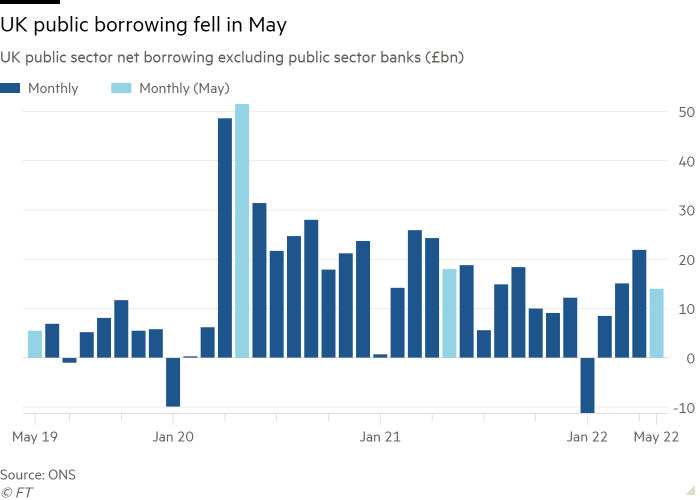Interest payments on UK government debt hit one of the highest levels on record last month as rising inflation limited an expected fall in public sector borrowing.
Interest costs rose to £7.6bn in May, well above the figure for last year and higher than a £5.1bn forecast from the Office for Budget Responsibility, following a rapid rise in retail price inflation to which many debt payments are linked.
The Office for National Statistics said the debt interest payments were the third highest made by the UK central government in any single month and the highest payment made in any May on record.
Inflation lifts government borrowing costs because gilts linked to the retail price index make up 25 per cent of UK government debt.
Official data released on Wednesday showed that the RPI rose at an annual rate of 11.7 per cent in May, the fastest pace since December 1981.
Public sector net borrowing nonetheless declined in May — but by less than expected — as inflation also aided government finances by bringing in higher tax revenues.
Borrowing in May was £14bn, down £4bn from the same month last year, according to ONS data published on Thursday. But May’s borrowing was higher than the £12bn forecast by economists polled by Reuters and well above the £10.3bn expected by the OBR.
The strong labour market and reopening of the economy boosted government income too. In May, government receipts rose by £5.7bn, including a £3.4bn annual increase in tax receipts.
Samuel Tombs, economist at Pantheon Macroeconomics noted that even government receipts undershot the OBR forecasts, particularly for consumption tax revenues. This may suggest “that the economy is underperforming the OBR’s expectations,” he said.

Borrowing for April was also revised up. This means that the public finances for the current fiscal year “have got off to a disappointing start,” said Martin Beck, chief economic advisor to the EY Item Club.
Chancellor Rishi Sunak said: “Rising inflation and increasing debt interest costs pose a challenge for the public finances, as they do for family budgets.”
He added that “being responsible with the public finances now will mean future generations aren’t burdened with even higher debt repayments, and we can secure our economy for the long term”.
The rising interest payments were also partially offset by the end of most Covid-19 government support schemes.
Public sector net debt, or the borrowing accumulated over time, was 95.8 per cent of gross domestic product, the highest ratio since the early 1960s.
Borrowing figures for this year do yet include the £15bn package of government measures announced last month and aimed at supporting households with soaring energy bills.
Michal Stelmach, senior economist at KPMG UK said that “the pace of deficit reduction is set to slow over the coming months” as a result of the government’s latest support package and weaker economic growth. “Debt reduction this year remains a long shot,” he added.
“Growth in receipts is likely to come under increasing pressure from faltering activity,” echoed Beck. Official data showed that the economy had already stopped growing since January.
Tombs estimates that public borrowing will total about £130bn this year, well above the OBR’s £99bn forecasts. Despite that, he predicted that Sunak would start to cut taxes next year “in an attempt to improve his party’s chances of re-election”.
